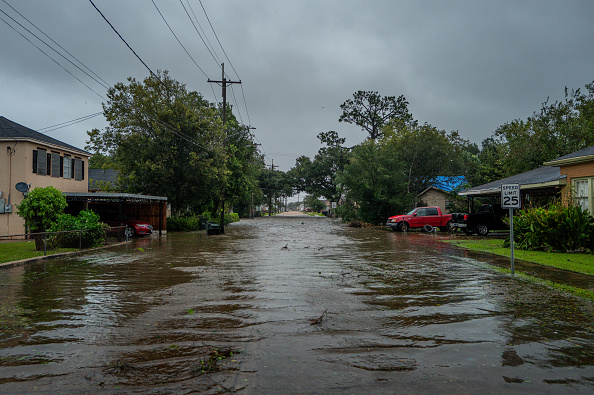AARP Hearing Center
Louisiana Hurricane: How to Get Information and Assistance
En español
Federal assistance is available for Louisiana residents and businesses dealing with the aftermath of Hurricane Francine, which caused widespread property damage and power outages when it came ashore on Sept. 11.
President Joe Biden on Sept. 16 approved a major disaster declaration, making federal funding available to residents and businesses that sustained losses. Louisiana Gov. Jeff Landry on Sept. 18 instituted a state of emergency through Oct. 18, an order that includes a prohibition on price gouging.

Landry declared a state of emergency before the storm’s arrival, and some coastal area residents were ordered to evacuate. On Sept. 10, Biden approved an emergency declaration for the state, allowing for federal assistance to supplement local, state and tribal responses to the storm. The declaration also allowed the Federal Emergency Management Agency (FEMA) to coordinate disaster relief efforts.
AARP has compiled a list of government, nonprofit and other aid available to help those affected.
Federal assistance
FEMA: The Federal Emergency Management Agency provides assistance to individuals and families dealing with the aftermath of weather disasters. Federal funding is available for multiple parishes. Residents and businesses that suffered damage may begin applying for assistance at DisasterAssistance.gov, by calling 800-621-FEMA (3362) or through the FEMA App.
U.S. Small Business Administration: The SBA provides low-interest disaster loans to help both homeowners and businesses recover. Apply on the SBA’s website.
State assistance
Governor’s Office of Homeland Security & Emergency Preparedness (GOHSEP):
- Find information about financial assistance after a disaster or storm through GOHSEP, including recovery grants.
- Getagameplan.org has information on storm recovery.
- The state’s website provides resources on disaster recovery assistance.
- Download the Get a Game Plan App to access emergency information on the go, including real-time updates.
Food and housing assistance after a disaster
Damage.LA.Gov: Report damage to your home in the aftermath of a storm.
Louisiana 211: For assistance with a variety of nonemergency, disaster-related needs such as shelter and food, dial 211. Available online at louisiana211.org.
Louisiana food banks: The website Feeding Louisiana provides a list of food banks statewide.
American Red Cross: The Red Cross website lists open shelters near you, or call 800-RED-CROSS. The American Red Cross of Louisiana has supplies, resources and disaster teams to help.
Salvation Army: The charitable organization provides disaster-related assistance, including food and shelter.
FEMA: Go online to FEMA.gov or download the FEMA App to search for shelters. You can also text SHELTER and your ZIP code to 43362 (for example, Shelter 12345).
Power outages
Utility companies: Report storm outages to your utility company. The Louisiana Public Service Commission’s website lists utility companies. Find a map of electricity outages from PowerOutage.US and Entergy. Register for outage alerts and get text messages with updates on power restoration efforts.
Ready.gov: Find tips for navigating a power outage at Ready.gov/poweroutages.
Mental health resources
Disaster Distress Helpline: For help with your mental health after a disaster, call or text the federal Substance Abuse and Mental Health Services Administration’s toll-free helpline at 800-985-5990. It is available 24 hours a day, seven days a week, to all U.S. residents who are experiencing emotional distress due to disasters, including storms. Help is available in multiple languages.
988 Suicide & Crisis Lifeline: Call 988 and be connected with free and confidential support. This website has a feature that allows you to chat online.
Emergency alerts and updates
FEMA.gov: Download the FEMA App for real-time alerts from the National Weather Service. Emergency officials may also reach you via the Emergency Alert System and Wireless Emergency Alert, which don’t require sign-up.
Weather and local news outlets: Tune in to radio stations to hear National Oceanic and Atmospheric Administration (NOAA) information on current and forecasted weather. Enter your city, state or ZIP code at weather.gov to find the latest forecast and storm-related news. Monitor local television and radio stations for the latest information and instructions from emergency personnel.
Storm safety tips
GOHSEP: The state’s website getagameplan.org provides storm guidance on how to prepare, stay safe and recover. It features information on hurricanes and power outages.
Ready.gov/Hurricanes: Get advice from the U.S. Department of Homeland Security on how best to prepare for a hurricane, stay safe during the storm, return home and recover afterward.
U.S. Centers for Disease Control and Prevention: The agency has information on emergency preparedness.
Healthcare Ready: Make sure you have a supply of necessary medications packed in case you need to evacuate quickly. If you need to evacuate and don’t have your prescriptions, visit the website RxOpen.org, which provides information on open pharmacies in areas impacted by disasters.
Louisiana Department of Transportation & Development (DOTD): Information on road conditions and closures. Check conditions by calling 511 or 888-ROAD511 (888-762-3511).
Editor’s Note: This story was originally published on Sept. 12, 2024 and has been updated with new information.
Michelle Tuccitto Sullo is a states writer and editor for AARP. She previously served as managing editor of the Hartford Business Journal in Connecticut and has worked for the New Haven Register, the Connecticut Law Tribune and New Haven Biz.
Also of Interest:
- What to do after Disaster Strikes
- How to Prepare for Natural Disasters
- How to Recover From Natural Disasters
- How Older Adults Should Prepare for Floods, Hurricanes and Other Emergencies
- Tropical Storm Francine: Essential Resources Before, During and After the Storm
- The New Go Bag: What You Need in Your Emergency Escape Kit

































































